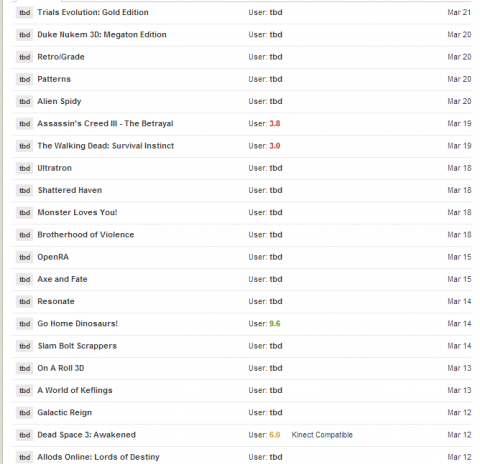I turned 28 this past Tuesday and as with all birthdays past a certain age, it led to an examination of my life and its contents. During these musings the strong relationship between my video game hobby and its roots in childhood play activities re-occurred to me. I say re-occurred because this is a topic that has been explored by greater minds, and first introduced to me by the book "Rules of Play".
One set of parallels that can be drawn between childhood play and its extension to video games, is the translation of childhood games and activities to video game genres. From toy cars we draw the line to the racing game genre, from our toy guns we fire a straight shot to the first person shooter genre, and from a combination of dice based board games and dressing up Barbie we have role-playing games.
At this point, video game naysayers would claim that the parallels between video games and childhood play result from the childhood having never ended. The rest of us will recognise that the parallels to childhood play actually results from both sets of activities mimicking aspects of human life. Just as a sword fight between 5 year olds represents physical conflict from human history, so can a game of Ninja Gaiden, and like their real-world counterpart, both these activities often end in tears.
This symmetry between childhood play and video games is however lacking when one attempts to find a parallel for an imaginary tea party or the infamous activity of making two dollies kiss one another. Many a boy with an older sister had to watch helplessly as GI Joe was utterly emasculated by this practice and thinking that "from now on, one of the other Joes might be better suited to hold the rocket launcher". However, when I search for established, core game genres that match these activities, my mind only comes up with The Sims.
The Sims however does not fully model the social proprietaries one needs to master for a successful imaginary tea party, and most definitely not the squishy mechanics of a kiss. At best, it matches those play activities of decorating a dollhouse and feeding a baby doll. That it stands alone in attempting to model these types of play activities speaks as much to the disparity between video game mechanics and play activities considered effeminate, as the series' success speaks to the potential of modeling such play activities in video games.
If play activities and their video game counterparts mimic aspects of the human experience, and if video game designers are restricting their games to those play activities preferred by boys, we are limited in our ability to express certain aspects of life in the video game format. Your first thought may be why we should even care to model such activities and wondering if they necessarily would translate to video game play experiences that are fun.
David Jaffe recently remarked on game designer's current obsession with integrating story-telling with video games, and how it seems ill-fitting, since movies and books seem better suited for story-telling purposes. I believe the reason that the story-telling capabilities of video games are limited are because the game-play mechanisms whereby certain stories can be told are limited. Instead of developing game-play representations for story occurrences, game designers are force-fitting the story telling techniques of movies and books into video games. The result of this is that whenever the story consists of jumping and shooting we have game play, and for everything else we require a lost diary or a cut-scene.
In terms of story structure, the reason that our video game heroes are constantly saving the world, is that the game mechanics we currently possess only allows us to craft the crudest narratives. Those games attempting to craft more intimate narratives, find themselves completely lacking game play altogether. I find the explanation that player agency and game play, run contrary to narrative to be limited, and that the explanation should rather state that player agency and game play run contrary to the fixed narrative of movies and books. Game play is a perfect fit for emergent narrative and in order to tell more interesting game play stories we require more divergent game play mechanics.
I therefore appeal to game creators to embrace the play experiences that video games have neglected. Go ahead and make a game about the etiquette surrounding a tea party, go ahead and make a kissing simulation that goes beyond a button press choice to do so. If the idea of moving your analogue sticks together to make game characters kiss feels perverted, ask yourself why you are OK with making the same motions to snap someone's head off.
If we find engaging video game simulations of the two play experiences mentioned above, we already have the makings of "Pride and Prejudice" the video game and suddenly the world of gaming would be introduced to an entirely new audience. At the very least, we could broaden the palette with which our current game experiences are painted and widen the options for narrative without crushing game play. So I say to you, make the dollies kiss!



Log in to comment